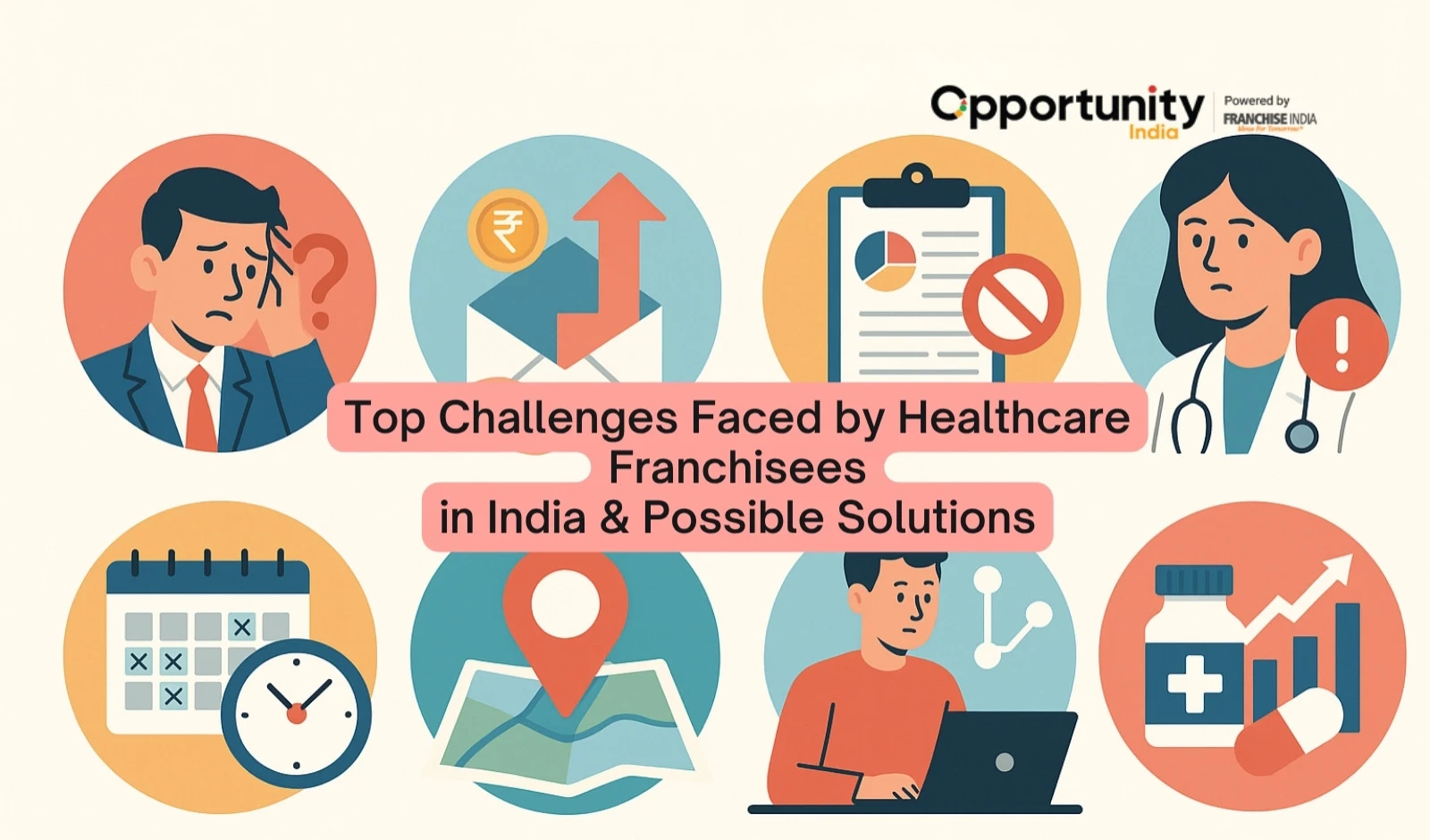
Are you considering entering the Indian healthcare franchise market? Excellent decision! Healthcare is one industry that is constantly in demand, whether it be a pharmacy, wellness center, diagnostic lab, or even a physiotherapy facility. But let's have a serious conversation before you sign that franchise deal and start taking patients. Even though this industry is growing, it's not easy. In the healthcare industry, many franchisees have common issues that can be resolved. Understanding these challenges in advance will help you avoid financial loss, anxiety, and restless nights if you intend to invest in this field.
The Allure of Healthcare Franchisees in India
Let’ be honest, we all know that healthcare franchising is a compelling option due to its remarkable expansion. This has been driven by government efforts, growing incomes, and more health awareness. Using well-known brands and business methods, it provides entrepreneurs with an organized approach to enter this expanding sector. However, it has its own set of difficulties, much like every growing industry.
Also Read: 15 Profitable Rental Business Ideas in India
According to projections, India's total healthcare market will increase from $167 billion in 2022 to $458 billion in 2030, with digital healthcare. For long-term growth and success, it is critical for both current and prospective healthcare franchisees in India to understand these challenges and arm themselves with workable answers. It's important to understand why healthcare franchising is so alluring in India before diving into the challenges:
- Growing Demand: The enormous population of India and the rising incidence of lifestyle-related illnesses guarantee a steady and growing demand for high-quality medical care.
- Brand Recognition: In an industry where credibility is critical, franchises provide instant brand trust and memory.
- Decreased Risk: The risks involved in launching an independent firm are greatly reduced by a developed business plan, tested procedures, and continuous franchisor support.
- Operational Support: To relieve the strain on franchisees, franchisors frequently offer thorough training, marketing support, supply chain management, and technology integration.
- Government Focus: Ayushman Bharat and other initiatives are expanding access to healthcare and opening up new franchised model prospects, particularly in Tier 2 and Tier 3 cities.
Common Types of Healthcare Franchises in India
Before diving into challenges, here are the most popular healthcare franchise formats in India:
| Type | Examples |
|---|---|
| Diagnostic Labs | Dr. Lal PathLabs, Thyrocare, Metropolis |
| Pharmacy Chains | Apollo Pharmacy, MedPlus, 1mg, Netmeds |
| Clinics & Polyclinics | Apollo Clinic, Lifespan Diabetes Clinic |
| Physiotherapy & Rehab | Qi Spine Clinic, AktivOrtho |
| Wellness & Nutrition | VLCC, HealthifyMe, Nutrience |

Top Challenges Faced by Healthcare Franchisees in India
High Initial Investment
Challenge:
Establishing a medical facility is not cost-effective. Whether you're starting a pharmacy or a diagnostic lab, you'll need funding for staff, setup, equipment, licensing, and branding. Healthcare franchises need a large initial investment, and small investors may become discouraged as a result.
Solution:
- Start with more manageable formats, such as single-service clinics or collection centers.
- For low-investment models or equipment leasing, choose franchises.
- Examine government funding options for wellness and diagnostic facilities in Tier 2 and Tier 3 cities.
Regulatory & Licensing Hurdles
Challenges:
Don't assume that managing a healthcare organization is solely about providing patient care. It might be difficult and time-consuming to navigate local compliance, FSSAI approvals, medical licenses, medication laws, and NABL accreditation.
Solution:
- Join forces with franchises that provide help with documentation and regulatory support.
- Employ a consultant for healthcare compliance.
- Keep informed with federal and state health rules, particularly those pertaining to pharmacies and pathology labs.
Also Read: Franchise vs. Independent Jewellery Business: What's More Profitable in India?
Shortage of Qualified Staff
Challenges:
Without a licensed pharmacist, a pharmacy cannot function. or a laboratory with untrained personnel. And you know what? It's difficult to discover and keep good employees. Skilled medical professionals frequently favor large cities or hospitals.
Solution:
- Select franchises that provide hiring assistance and training.
- Collaborate with nearby nursing or medical schools to hire staff and offer internships.
- To keep your team, provide tiny benefits like performance bonuses.
Heavy Local Competition
Challenges:
Let's face it, most places have plenty of tiny clinics and pharmacies. It might be challenging for branded franchises since local competitors may have razor-thin margins and lower prices. Price is a major consideration for customers, particularly in semi-urban areas. Local companies frequently have high levels of community trust.
Solution:
- Providing a better experience—branded packaging, precise reports, and a tidy setup.
- Offer value-added services like home delivery, loyalty discounts, online reservations, or health camps.
- Make use of your brand's reputation to establish credibility.
Limited Decision-Making Freedom
Challenges:
One drawback to franchise ownership? It's not always possible to do things your way. The franchisor sets a lot of things, including prices, offers, and services. Customers who seek adaptable solutions may stop doing business with you.
Solution:
- Negotiate a certain amount of autonomy before signing the contract, particularly in the areas of marketing and customer service.
- Inform the franchisor frequently on what is and is not working.
- Select a brand that is adaptable and innovative.
Also Read: How to Start a Scrap Business in India 2025?
Maintaining Service Standards & Brand Reputation
Challenge:
It only takes one minor error—the incorrect medication, a delayed report, or impolite conduct—to go viral. People quickly lose faith in the sensitive field of healthcare. The reputation of the entire brand can be impacted by a single negative customer experience, particularly in the delicate healthcare industry.
Solution:
- Observe the rigorous SOPs (Standard Operating Procedures) that the franchisor has established.
- Keep a close eye on customer satisfaction and service quality.
- Perform staff assessments and audits every three months.

Digital Transformation & Technology Cost
Challenge:
App-based reporting, telemedicine, online booking, and EMR systems all need technical setup and have recurring expenses. In the modern healthcare industry, technology cannot be compromised. People anticipate teleconsultations, smartphone apps, online reporting, and even UPI payments from pharmacies and wellness clinics.
Solution:
- Choose franchise brands with integrated technology platforms.
- Reduce your reliance on hardware by using cloud-based SaaS solutions.
- Teach employees how to use digital tools effectively for smooth functioning.
Key Considerations:
- Start small, scale quickly: Start with a single center, assess demand, and then grow by acquiring several units.
- Go hybrid: Provide in-clinic and at-home services to increase your client base.
- Remain compliant: Don't cut corners on rules; it's preferable to go slowly than to run foul of the law.
- Make your marketing more local: Tailor your outreach to local languages and platforms, such as YouTube, Instagram, and WhatsApp.
- Track KPIs: Keep an eye on indicators such as patient volume, return business, client happiness, and break-even point.
Is a Healthcare Franchise Right for You?
Yes, if:
- You're passionate about wellness or healthcare.
- You are able to oversee quality and operational compliance.
- You're prepared to make time, money, and people management investments.
No, if:
- You anticipate earning 100% passive income.
- You're uncomfortable taking on responsibilities relating to healthcare.
- You desire total operational autonomy.
Also Read: How to Grow Mushrooms at Home: Business Plan?
Conclusion
One of the most lucrative yet challenging industries in India is healthcare franchises. It can be lucrative and rewarding if you have a strong interest in health, are prepared to adhere to regulations, and are prepared to improve the quality of your services. Although there are many prospects in the healthcare franchise industry in India, it is not a "plug-and-play" arrangement. Franchisees must focus on providing high-quality service, adhere to rules, and strike a balance between commercial savvy and empathy.
You may create a successful, scalable, and influential healthcare business that improves not only your financial situation but also the health of your community by being aware of the challenges ahead and planning appropriately.

